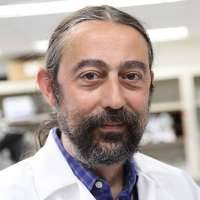
Adolfo García-sastre PhD
Infectious Disease, Immunology and Microbiology
New York, New York, United States of America
Connect with the speaker?
Dr. Garcia-Sastre is Professor in the Department of Microbiology and Director of the Global Health & Emerging Pathogens Institute at Mount Sinai School of Medicine in New York. He is also Principal Investigator for the Center for Research on Influenza Pathogenesis (CRIP), one of five NIAID Centers of Excellence for Influenza Research and Surveillance (CEIRS). Together with Charlie Rice, he is the leader of the basic research component on Viral Therapeutics and Pathogenesis of the North East Biodefense Center proposal, which was funded by NIAID and involves the collaboration of more than 20 academic institutions in New York, Connecticut and New Jersey.
For the past 20 years, his research interest has been focused on the molecular biology of influenza viruses and several other negative strand RNA viruses. During his postdoctoral training in the early 1990s, he developed for the first time, novel strategies for expression of foreign antigens by a negative strand RNA virus, influenza virus. He has made major contributions to the influenza virus field, including 1) the development of reverse genetics techniques allowing the generation of recombinant influenza viruses from plasmid DNA (studies in collaboration with Dr. Palese); 2) the generation and evaluation of influenza virus vectors as potential vaccine candidates against different infectious diseases, including malaria and AIDS; 3) the identification of the biological role of the non structural protein NS1 of influenza virus during infection: the inhibition of the type I interferon (IFN) system; and 4) the reconstruction and characterization of the extinct pandemic influenza virus of 1918. His studies provided the first description and molecular analysis of a viral-encoded IFN antagonist among negative strand RNA viruses. These studies led to the generation of attenuated influenza viruses containing defined mutations in their IFN antagonist protein that might prove to be optimal live vaccines against influenza. His research has resulted in more than 100 scientific publications and reviews. He was among the first members of the Vaccine Study Section of the NIH.
For the past 20 years, his research interest has been focused on the molecular biology of influenza viruses and several other negative strand RNA viruses. During his postdoctoral training in the early 1990s, he developed for the first time, novel strategies for expression of foreign antigens by a negative strand RNA virus, influenza virus. He has made major contributions to the influenza virus field, including 1) the development of reverse genetics techniques allowing the generation of recombinant influenza viruses from plasmid DNA (studies in collaboration with Dr. Palese); 2) the generation and evaluation of influenza virus vectors as potential vaccine candidates against different infectious diseases, including malaria and AIDS; 3) the identification of the biological role of the non structural protein NS1 of influenza virus during infection: the inhibition of the type I interferon (IFN) system; and 4) the reconstruction and characterization of the extinct pandemic influenza virus of 1918. His studies provided the first description and molecular analysis of a viral-encoded IFN antagonist among negative strand RNA viruses. These studies led to the generation of attenuated influenza viruses containing defined mutations in their IFN antagonist protein that might prove to be optimal live vaccines against influenza. His research has resulted in more than 100 scientific publications and reviews. He was among the first members of the Vaccine Study Section of the NIH.
EVENTS & ACTIVITIES (Speaking, Spoken, and Authored)
Influenza 2019
Webcast
Infectious Disease
Nov 06, 2019
14th Vaccines Research and Development Conference
In-Person Event
Infectious Disease
Jun 02 - 03, 2016
San Diego, California, USA
Viruses 2016 - At the Forefront of Virus–Host Interactions
In-Person Event
Biochemistry and Molecular Genetics
Jan 26 - 28, 2016
Basel, Basel-Stadt, CH
Infectious Diseases Society of America (IDSA) : IDWeek 2015
In-Person Event
Infectious Disease
Oct 07 - 11, 2015
San Diego, California, USA

